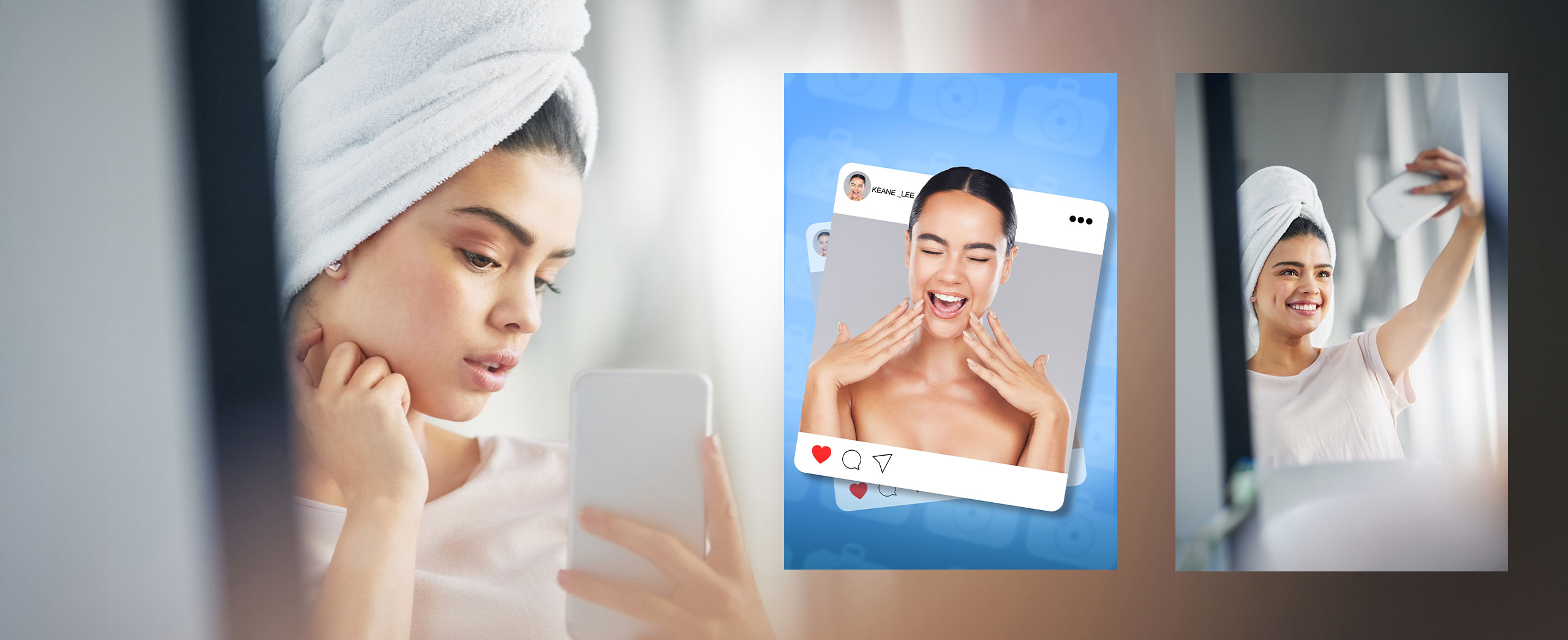Social Media’s Influence on Skincare: The Rise of Dermfluencers
Did you know hashtags like #skincare and #dermatology have amassed billions of views on social media platforms such as TikTok, Instagram, and YouTube? Social media’s impacton the skincare industry is undeniable, and at the forefront of this movement are “dermfluencers.” These influencers—ranging from board-certified dermatologists to passionate skincare enthusiasts—share tips, product reviews, and educational content with millions of followers. But how do they shape public perceptions of skincare, and what does this mean for dermatology?
Who Are Dermfluencers?
Dermfluencers, a blend of “dermatologist” and “influencer,” have become trusted voices for skincare advice online. Board-certified dermatologists use platforms to simplify complex skin health concepts, bust myths, and advocate for preventive care, likesunscreen use and regular skin checks.
At the same time, n
on-professional skincare enthusiasts share personal routines, product recommendations, and hacks they’ve found helpful. While some of these insights resonate with followers, others lack scientific backing, creating room for misinformation and potentially harmful practices.
Why Social Media is Changing Skincare for the Better
Dermfluencers have brought several benefits to the world of skincare:
- Increased Awareness: More people are learning about skin conditions like acne, rosacea, and eczema—and the importance of sun protection.
- Proactive Skin Health: Skincare trends are encouraging individuals to address skin concerns early, sometimes even before seeing a dermatologist.
- Affordable Solutions: Dermfluencers often highlight budget-friendly, over-the-counter products that make skincare accessible to more people.
The Risks of Skincare Trends on Social Media
While social media has its perks, there are some significant challenges:
- Oversimplified Advice: Skincare is highly individualized. What works for one person may not work for another, especially since skin types and conditions vary widely. This can lead to unrealistic expectations or inappropriate treatments.
- Exaggerated Results: Viral videos often feature filtered, edited, or exaggerated transformations that set unattainable goals.
- Misinformation: Non-expert influencers might promote unproven remedies—like using toothpaste for acne or harsh DIY exfoliants—that can do more harm than good.
- Delays in Professional Care: Relying on online advice can lead some to postpone seeing a dermatologist for serious skin conditions.
How Dermfluencers Are Reshaping Dermatology Clinics
The rise of social media has also changed how dermatologists interact with patients:
- Informed Patients: Many patients now come to appointments with a basic understanding of skincare ingredients, like retinol and hyaluronic acid, which can streamline initial consultations.
- Misinformation Correction: Dermatologists spend time debunking myths or explaining why certain viral hacks aren’t effective—or safe.
- Increased Demand for Expertise: As awareness grows, more people are seeking professional care for chronic or complex skin conditions.
How to Safely Navigate Skincare Advice Online
If you’re turning to social media for skincare tips, here’s how to separate fact from fiction:
- Check Credentials: Seek advice from board-certified dermatologists or other medically trained professionals.
- Be Skeptical of Trends: Viral hacks, like using coffee scrubs or lemon juice, often lack scientific backing. Stick to evidence-based practices.
- Tailor Your Routine: Skincare is not one-size-fits-all. Consider consulting a dermatologist for personalized recommendations.
- Avoid DIY Remedies: Many home-based remedies can be harsh and potentially damage your skin. Professional-grade products and guidance are safer options.
The Path Forward: Balancing Trends and Expertise
As dermfluencers continue to shape how we think about skincare, they present both opportunities and challenges for consumers and professionals. By balancing engaging online content with science-backed advice, dermatology can bridge the gap between social media trends and effective care.
For consumers, the key is to approach skincare advice thoughtfully, verifying credibility and seeking professional help when needed. For dermatologists, leveraging social media to educate and engage can help combat misinformation while empowering patients to take control of their skin health.
The future of skincare is being written one post, reel, and video at a time. Let’s make it a story that prioritizes safety, science, and healthy skin for all.
If you’re struggling with frequent or severe cold sores, reach out to a dermatologist for expert guidance. Together, we can create a plan to help you feel your best all winter long. Book an appointment on our website or give our office a call at 203-538-5682 to schedule your checkup/screening.

